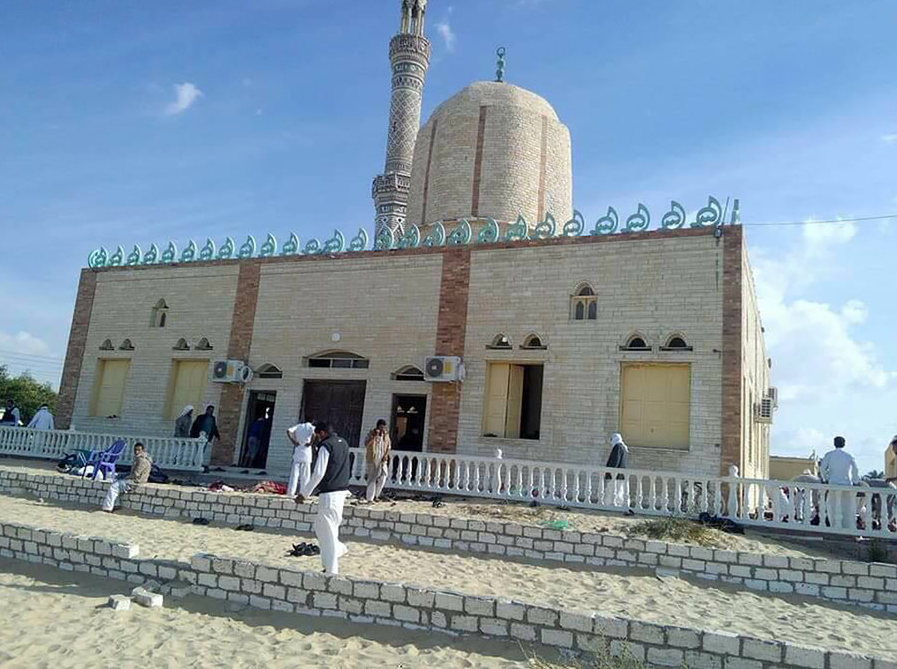Egypt’s Sinai Mosque Assault
Militants detonated a bomb inside a crowded mosque in the Sinai Peninsula on November 24th, 2017. They also sprayed gunfire on panicked worshipers as they fled, killing at least 305 people, and wounding 128 others. Officials call it “the deadliest terrorist attack in Egypt’s modern history”.
“The scene was horrific,” said Ibrahim Sheteewi, a resident of Bir al-Abed, the small north Sinai town where the attack took place. “The bodies were scattered on the ground outside the mosque. I hope God punishes them for this.”
The Egyptian military carried out several airstrikes near Bir al-Abed targeting militants fleeing in vehicles, a military official said.
Egypt’s top prosecutor, Nabil Sadek, said that the death toll had risen and included at least 27 children. A witness said he helped gather 25 bodies of them.
Between 25-30 militants carried out the attack. They barged in carrying automatic weapons and the Islamic State flag.
World leaders despised the attack, with President Trump saying it was “horrible and cowardly”. He said later that it explained why the US needed a border wall with Mexico and restrictions on immigration.
The attack started midday during Friday Prayers when a bomb ripped through Al Rawda mosque in Bir al-Abed, 125 miles northeast of Cairo.
Many were taken to the general hospital in the main northern Sinai town of El Arish. Staff tried to deal with a “flood of dead and wounded, many with extensive burns or severed limbs”.
“We are swamped. We don’t know what to say. This is insane,” said one medical official.
“The military and the police will take revenge,” said Mr. Sisi on a televised speech.
There are quite likely a few reasons why this attack took place when it did, including the rejection of radical groups by the residents of this northern Sinai village.
One reason relates to extremist Islamists who deny the historical authenticity of Sufism within Islam. Isis and others have declared their open rejection of Sufism, and their media outlets have been inciting violence against Sufis for quite some time.
There is an extremist ideology that exists that rejects orthodox Sufism ISIS is a sunni muslim terrorist group that consider sulfis “not real” to muslims.
If we take a look at the Manchester Arena bombing, where 22 people were killed in the terror attack at an Ariana Grande concert, we see that the group responsible for this attack was ISIS.
Salman Abedi was born in Manchester in 1994 and is of Libyan descent. He is thought to have attended the Manchester Islamic Centre, also known as Didsbury Mosque, along with his parents and siblings. Abedi is believed to have traveled to Syria and had proven links with the terror group Islamic State of Iraq and the Levant.
An unnamed Muslim community worker told the broadcaster that two people who knew Abedi at college tipped off officers when he made statements “supporting terrorism” and believing that “being a suicide bomber was OK”.
One immediate consequence of the terror attack in Manchester on Monday night is the “escalation of the terror threat level in the UK to critical”.
Both the Sinai mosque assault and Manchester bombing were terrorist attacks (most likely caused by ISIS). The individuals that made the attacks are making statements that they are here, and they can cause huge damage. ISIS militants are taking advantage of the sparse presence of the Egyptian security forces and target a remote, unsecured target.
Terrorism, racism, and religious differences are very evident. The terrorism occurs when a group that feels disempowered has a major problem with a nation state and thinks that the only way to spread their beliefs is through violence. There are only a few solutions to that situation:
- The group ceases to be because it’s members have been captured, killed, or internal politics pulls it apart.
- The group independently decides to renounce violence.
- The state open talks with the group to find a peaceful solution.
Number 1 has occurred, but only because of internal problems within the group. Jailing or killing terrorists has not been very effective as a long term solution. It often creates new terrorists.
Number 2 is rare, but can only occur if they don’t feel violence is working.
Number 3 is, historically, the most successful. It can be a slow process though. Finding enough common ground for negotiations can be difficult. It can be politically unpalatable, as it does require compromising with a hated enemy.
Communication is mandatory when trying to resolve a problem with terrorism, racism, or religious differences.
Rest in peace to the innocent lives that were taken from both attacks.
#Cairo2DC
Source 1: http://www.cnn.com/2017/11/25/africa/egypt-sinai-mosque-massacre/index.html
Source 2: http://www.manchestereveningnews.co.uk/all-about/manchester-terror-attack


cheli . • Dec 12, 2017 at 9:15 am
I feel sorry for those who lost their lives. I hope someday the world have peace.